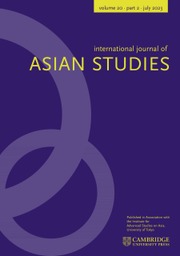Article contents
SEXUAL HEALING: REGULATING MALE SEXUALITY IN EDO-PERIOD BOOKS ON ‘NURTURING LIFE’
Published online by Cambridge University Press: 20 June 2013
Abstract
The present article explores health as a factor in the understanding of Edo-period male sexuality. This notion was systematically propagated by a genre of health guides on ‘Nurturing Life’, which came to circulate widely at the time. Sexuality was seen as an integral element of a healthy life-style in these didactic texts, which aimed to instruct people on how to live a long life unharmed by disease. In order to achieve this goal, the health-seeker was to strictly control his everyday activities, including eating, drinking alcohol, sleeping – or sexual intercourse. By consequence, a certain kind of sexual behaviour emerged from these works as ‘healthy’, while deviations from the prescribed standards are medicalized away as harmful to the body, in extreme cases even fatal. At the same time, bodily health is presented as inextricably bound up with moral ‘health’. Thus, the rhetoric of control imposed on the body was extended from the purely medical to the moral, making the health-seeking individual at the same time a good (male) subject and model head of household within an ideal Confucian-inspired society. The ‘healthy’ sexuality of writings on Nurturing Life therefore has to be situated at the crossroads of medical beliefs and moral parameters.
- Type
- Research Article
- Information
- Copyright
- Copyright © Cambridge University Press 2013
References
REFERENCES
- 2
- Cited by


